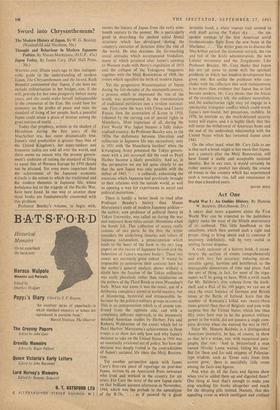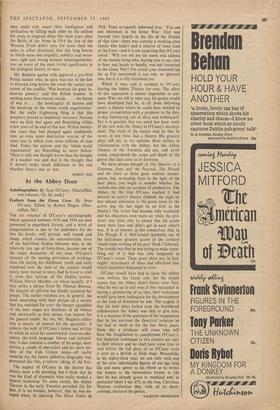Act One
World War I : An Outline History. By Hanson W. Baldwin. (Hutchinson, 2.1s.)
A GREAT deal more argument about the First World War can be expected as the publishers rightly make the most of the fiftieth anniversary of its outbreak. This little handbook to the cataclysm, which then seemed such a right and proper thing to bring about and to continue if necessary indefinitely, will be very useful in settling factual disputes.
A ready reckoner of a history book, it recon- structs the surface of events comprehensively and with very fair accuracy, reducing incon- ceivable agony, heroism and heartbreak to the manageable dimensions of time and place. Just the sort of thing, in fact, for most of the argu- ments we'll be going to have. With a swift reach for Mr. Baldwin's slim volume from the book- shelf and a flick of his 160 pages, we can see at once the exact balance of German and British losses at' the Battle of Jutland, learn that the number of Rumania's killed was twenty-three times greater than that of Belgium, and note with surprise that the United States, which less than fifty years later was to be the greatest military power in the world, did not possess a single com- plete division when she entered the war in 1917.
Since Mr. Hanson Baldwin is a distinguished American journalist, he has, of course, to show us that he's a writer, too, with occasional para- graphs that run : 'And in Switzerland a man named Nicolai Lenin waited, biding his time.' But for these and for odd snippets of Polonius- type wisdom, such as 'Great oaks from little acorns grow,' there is mercifully little • room among the facts and figures.
And what do all the facts and figures show when you've added them up and digested them? One thing at least that's enough to make you stop reaching for books altogether and reach for the sleeping pills instead. Namely, that this appalling event in which intelligent and civilised men could only assert their intelligence and civilisation by killing each other by the million for years in stagnant slime (for three years after the Battle of the Aisne in 1914 the line of the Western Front didn't vary for more than ten miles in either direction), that this long horror in which sense and stupidity, nobility and mean- ness, right and wrong became indistinguishable, was an event of the most trivial significance in the biological history of man.
Mr. Baldwin quotes with approval a pre-1914 Polish banker who, he says, was one of the few to forecast long before the event the nature and extent of the conflict. War between the great in- dustrial powers,' said this Polish banker, 'is nothing more than mutual suicide . . . the future of war is . . . the bankruptcy of nations and the break-up of the whole social organisation.' But the really frightening thing is that this prophecy proved so hopelessly incorrect. Nations were on their feet again and flourishing within a few years of the end of that war. Within twenty- one years they had plunged again confidently into an even more destructive version of the same war in which even more millions of men died. Today the nations and the 'whole social organisation' are flourishing as never before. There is only one thought worse than the thought of a nuclear war and that is the thought that it doesn't make much difference in the end whether there's one or not.
ROBERT KEE



































 Previous page
Previous page